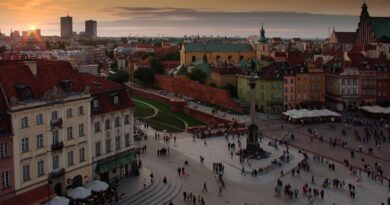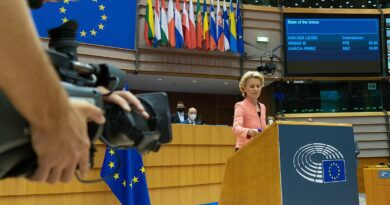The empire and the barbarians. How the EU elites are building a federal state

The so-called defense of the rule of law, the ecological crusade, or the LGBT revolution – all these are only tools used by the EU elites to build a modern empire and civilize the “barbaric” nations of Europe.
Jan Fiedorczuk
“If one of our voivodships were to declare that Polish law does not apply there, the Polish state would have to react firmly. The same goes for the EU. It has to react sharply, not out of spite, but to save the entire institution and the project” – these were the words of Tomasz Lis1 who commented on the conflict between Brussels and Warsaw.
When a few months ago in “Do Rzeczy” I wrote about “Unioners2 of Polish origin”, I meant exactly the attitude that was presented in a condensed form by the editor-in-chief of “Newsweek”. The European Union is considered to be a fundamental reference point and the main object of loyalty, while Poland is becoming something that the Germans refer to as “Heimat3” – the local “little homeland”. When it comes to a conflict between the EU and Poland, for the “Unioners” the choice is obvious.
In their vision, Europe is to be transformed into an integrated political organism, and national states are to be relegated to the role of EU voivodeships (local regions). Similar ideas have accompanied the process of European integration from the very beginning, but so far have not been met with particular enthusiasm by the Europeans themselves. The case of the “European constitution”, which was rejected in a referendum by the French and the Dutch, is quite visible in the matter at hand. The “Unioners” understood that if the Union was to turn into a unified organism, it would have to bypass democracy and organize a coup d’état without the participation of European citizens, who apparently have not grown into the vision of the Brussels aristocracy.
CIVILIZING THE “BARBARIANS”
Professor Andrew Tettenborn, in an article posted on the All Things Most Important (Wszystko Co Najważniejsze) website, recently indicated that Brussels officials “act like Roman legions that received orders from Rome concerning the subordination of further provinces”. This comparison is exceptionally accurate, because the “Unioners” do not strive to proclaim a federation, but a modern empire. The difference between these systems is subtle yet significant. The idea of an empire has been analyzed many times by philosophers and political scientists who indicate that it stands in radial opposition to the modern, centralized nation-state. For example, the federal state is simply a vast political organism made up of parts that are given a lot of autonomy. The imperial model, on the other hand, is based on an ideology which gives it a sense of existence.
This political system differs from simply a “big state” in two basic aspects: firstly, it has no fixed borders, and secondly, it has universalist aspirations, which makes it a-national – it transcends historical and cultural divisions, absorbing new communities. Put simply, the imperial model is possessed by an ideology and a need for continuous expansion to civilize the barbarians beyond its lines4.
There is no need to appeal to the conservatives when we can reach out to the very supporters of modern imperialism. One example is the star of the Western demoliberal salons, Yuval Noah Harari, who does not hide his fascination with this political model in his works. The Israeli historian (considered by Onet5 to be “the last authority on Earth”) points out that empires are characterized by “changing borders and a potentially insatiable appetite”, which in turn gives such constructs “a leading role in history”. Harari is currently, next to Klaus Schwab, the most recognizable ideologist of the world of the future, but of course he is not the only one circulating similar views. In fact, the famous neo-Marxists, Antonio Negri and Michael Hardt, present virtually the same approach in the famous work “Empire”, pointing out that “the basic feature of the Empire is the lack of a limes: its power knows no limits”. The famous globalization theorists Ulrich Beck and Edgar Grande present their views in a similar tone, promoting a vision of a post-modern “cosmopolitan Europe” in which nation-states will be “abolished”.
It is imperialism that explains the ideological fixation of “unionists” who look at conservative “barbarians” from a position of moral superiority, seeing them only as a subject matter that needs to be civilized. However, in order to carry the torch of education, Europe needs great concepts – and here we arrive at Poland’s problems.
(…)
CIRCUMVENTING DEMOCRACY
The EU elites have learned the lesson from the unsuccessful attempt to introduce a constitution for Europe in 2005. If the EU is to turn into a pan-European empire, it must not put its fate in the hands of an unpredictable mass of voters. The empire must be established for the good of Europeans against their will. It is much easier to teach about democracy to the periphery, than to have to accept its verdict. Contemporary “barbarians” need to be captured and civilized. This is why last year it was decided to take advantage of the political turning point associated with the coronavirus and – as a result of incurring debt on a community level – impose the so-called conditionality mechanism. The so-called rule of law is another pillar of “a brave new Europe”. After all, the entire procedure, pompously referred to as the “EU’s Hamiltonian moment”, was carried out without a single referendum. This is a turning point that serves to reshape Europe into a single legal area, and issues such as LGBT or abortion are used for the further unification of legal systems, thereby weakening the sovereignty of the individual Member States. However, any concessions in this dimension will lead to further and further demands – after capitulating in the matter of abortion and “homosexual marriage”, Brussels will simply demand a uniform approach to homoadoption or euthanasia. This process will continue until the “rule of law” is observed across all of Europe.
Today, the vision of the EU as a legally and politically uniform organism dominates in the European Parliament, an example of which was seen during the vociferous debate concerning Poland. At that time, the deputies not only attacked Prime Minister Morawiecki, but also, more interestingly, openly criticized Ursula von der Leyen for being too loyal to Poland.
– What the Polish government is doing is an attack on the very existence of the European Union itself. (…). When a Member State questions the fundamentals, the Commission must act – German MEP Ska Keller instructed (!) the head of the European Commission. And she was not the only one.
It should therefore come as no surprise that in mid-October the European Parliament decided to sue the European Commission for its delay in applying the conditionality mechanism. This is a truly unprecedented event, albeit logical in its own way. After all, the deputy head of the European Commission, Věra Jourová, stated that “the whole Europe will start collapsing…unless we react to this new chapter which the Polish constitutional court started to draw”.
Of course, the “barbarians” are not only Poles or Hungarians who are defending their sovereignty. They were also the Irish, when they did not want to agree to the ratification of the Lisbon Treaty (so the referendum had to be repeated), or the Italians, when they democratically decided to entrust Silvio Berlusconi with ruling the country. The “barbarians” were also the British when they finally decided to leave the EU, but the French may also be branded as such if they decide to elect a right-wing, Eurosceptic president in a few months. For the “Unioners”, supporters of Brussels’ imperialism, democracy itself seems to be an offspring of barbarism.
1 Tomasz Lis is currently the editor-in-chief of Newsweek in Poland.
2 The author uses this term to refer to individuals who a larger patriotic sentiment towards the European Union than their country of origin.
3 The expression from German, literally meaning “homeland”, signifies a particularly strong attachment to and love for the community, space, and tradition that revolve around one’s home nation.
4 The term refers to the system of delimitation and border defense in the Roman Empire.
5 One of the largest Polish web portals in Poland, owned by Ringier Axel Springer Media AG.
The full version of this article was published in November 2021 in “Do Rzeczy” magazine.



